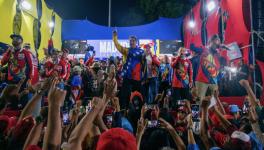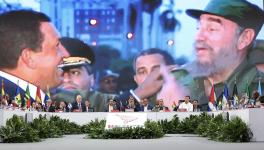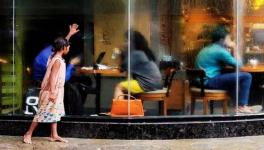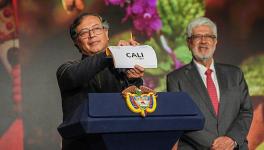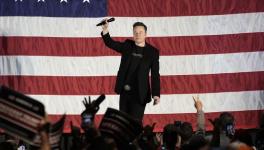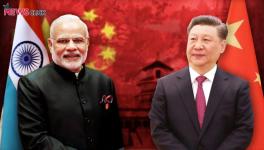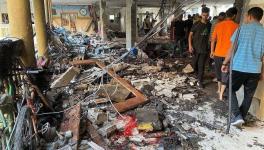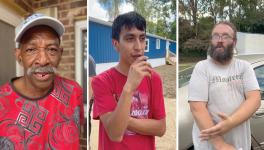Movements From Across the World Support Maduro

In Venezuela, to the grief of the anti-Chavistas, the year 2018 ended with a new victory of President Nicolás Maduro. His political grouping, the United Socialist Party of Venezuela (PSUV) and its allies in the Great Patriotic Pole (GPP), won the municipal elections held on December 9. Previously on May 20, Venezuelans had declared themselves democratically in favor of the re-election of the president, whose second term of government (2019-2025) begins this January 10.
Whereas in the political field, Chavismo –that completes 20 years in power– continues to receive majority of electoral support, in other areas, it confronts bigger challenges. In everyday life, for example, the economic war, the sanctions imposed by the United States and its allies have created a series of disadvantages –the rapid inflation among other issues– which severely complicate citizens’ normality.
Moreover, the financial hardship hinders the import of groceries, medicines and spare parts. And the persistent corruption aggravates things. All of which sometimes have dramatic outcomes. Consequently, many people are unhappy and some are opting to leave the country.
The opposition, victim of its errors, excess and internal fights, has been incapable of benefiting from this harsh social context. The Democratic Unity Roundtable (MUD) has disintegrated and atomized to an extent that it has become invisible and inaudible. Its main leaders –those settled abroad as well as those in Venezuela– continue to denounce the “dictatorship” and the “political repression”. But they lack credibility.
Adding to this already intricate panorama, there is the eternal media war against the Bolivarian Revolution that stages for the world terrible ingredients of catastrophic cinema, a supposed “Venezuelan disaster”.
Last September 26, in New York, before the UN General Assembly, president Maduro denounced in detail the various attacks of an “international aggression” against his country. He also recalled the criminal attempt to assassinate him in Caracas on August 4.
Any other leader, faced with such adversities, would have given up. But this is not the case with Nicolás Maduro, who, once again, has shown signs of exceptional resilience. To confront the economic war, he again surprised his opponents with a triple offensive: by strengthening the crypto-currency Petro, launching the Venezuelan Bolívar and proposing the Economic Recovery, Growth and Prosperity Program.
Despite the challenges, the Bolivarian Revolution continues to accomplish its objectives of social justice. A few days ago, the government delivered over 2.5 million units of dignified housing.The Local Committee for Supply and Production (CLAP) is providing basic food boxes to around 6 million poor families, is about to reach 3,000 productive municipalities and is advancing towards self-sufficiency in the production of maize, rice, sugar, pulses, cocoa, coffee and soya. In the education sector, more than 10 million people have access to education and 75% of them are availing it in public schools for free, from elementary education to university, which is continuously improving in terms of quality.
In international politics, Venezuelan authorities have continued to confront the hostility of Washington and some of its allies, particularly Europeans, as well as the attacks of the conservative Latin American governments who are part of the Lima Group. However, the attitude of various great powers whose heads of the state have expressed their solidarity with the Bolivarian Revolution has been very different.
Ignacio Ramonet: Perhaps the most important political event of the year 2018 was your re-election, in the polls held on May 20, with more than 6 million votes received and more than 40% vote difference with respect to the main opposition candidate Henri Falcón. How do you explain –in a context so difficult for citizens, created by the economic war and the financial sanctions imposed by Washington – such massive support?
Nicolás Maduro: Indeed, the people of Venezuela awarded the Bolivarian Revolution, Chavismo –that is a real political and social strength, which exists in the streets, neighborhoods, fields, cities and people – and also, I must say it with a lot of humbleness, awarded my candidature, the greatest support – percentage wise– that any candidate has ever obtained in the presidential elections in Venezuela.
We have been noticing –after the victory of peace with the constituent elections held in July 2017 – a sustained recovery of our forces, a reinforcement of the revolutionary unity –we received the support of all the parties of the Great Patriotic Pole and countless social movements. We are also seeing an organized growth of our United Socialist Party of Venezuela, which is the political party with the largest number of members in Latin America.
This positive result also explains the maturity and wisdom shown by our people in the middle of the most brutal aggression that we have suffered since our war of independence. Our people have grown; they have grown in conscience, in organized strength and in patriotism, against the psychological warfare and the illegal and illegitimate economic war perpetrated by the American empire with its satellite governments of this continent and Europe, in an attempt to break us. The result of this hostility has been the stubbornness shown by the citizens in their determination to remain free, independent and sovereign.
Another fundamental and decisive factor is that the Bolivarian Revolution has taken care of the needs of the Venezuelan society in the midst of difficulties and economic and financial harassment. Not a single school or a university has been shut here. On the contrary, the number of students in public education has increased. We continue to attend to the health of the people for free. We have protected, with great strength and determination, the salary and the employment of all the people. And approximately every three weeks, we carry the basic food, the already famous “CLAP boxes”, and deliver them directly to the houses of some 6 million families in Venezuela.
On the walls in Caracas, one can read the painted messages and see the graffiti which perhaps summarize what I said: “I vote for the one who increases my salary, not for the one who raises the price of the products”. Perhaps, this explains why the Bolivarian Revolution is now more strong, alive and amalgamated in a single constructed effort than ever.
IR: Your new six-year presidential term begins on January 10. Some governments that did not recognize the results of the presidential elections held on May 20 threaten to disregard you as Venezuela’s constitutional president. What do you have to say to them?
NM: Well, first of all, Venezuela is a country that has forged its identity, its republican character and its independence throughout history. In Venezuela governs the most democratic constitution that ever existed in our history, approved by our people nineteen years ago in a referendum. And this Constitution has been fulfilled impeccably in these nineteen years.
In 2018, we had two completely transparent elections, regulated by the electoral institutions of the country. Let me remind you that the Electoral Authority in Venezuela is a public power, the fifth public power. And this power used all its logistics and its electronic systems with highest level of transparency. It is recognized by prestigious international personalities, like [former US president] Jimmy Carter, who at the time said that the Venezuelan electoral system is the most transparent and meticulous system that he has seen in the world, the most perfect one.
The presidential election of May 20 was held under the monitoring of national and international observers. And our people took a decision. The decisions about Venezuela are not taken by foreign governments. We are not an invaded country under the custody of any empire, neither by the Northern Empire nor by its satellites in Latin America and the Caribbean or in Europe. In Venezuela, the people, in sovereignty, govern. And the people took a very clear and very overwhelming decision. For the first time, we secured 68% of the votes. Just as you pointed out earlier, there was a vote difference of over 4 million votes with respect to the main candidate of the opposition.
So, the people have decided. And we are going to honor their decision. There is no possibility for any government to say a single word, from abroad, to recognize, not recognize or disregard the constitutional and democratic legitimacy of the government that I will preside from 10 January 2019 to 10 January 2025. I have the plan, the project, the experience and the power. I’m counting on the people, with the civic-military union. And above all, with the constitutional legitimacy which is the most important thing.
Allow me to repeat this, the pressures and aggressions of the American Empire and its satellite governments mean nothing in front of the voice of our people. Our democracy possesses a real strength that has been expressed in 25 elections in the last twenty years.
In the election campaign of April and May 2018, which lasted twenty-one days, I visited the twenty-three Venezuelan states several times. And I asked the people who populated the streets and avenues, “Who chooses the president in Venezuela? Washington or Caracas? Miami or Maracaibo?” And the energetic response of all the people, including those who vote for the opposition, was that we have the inalienable right to elect our rulers. Nothing and no one will change this fundamental and sacred right.
To anyone who has a problem with this, we say that Venezuela has a long tradition of non-interference in the affairs of other states. The Bolivarian Revolution has been in solidarity with all the countries of our continent and the world if they have needed us in the face of natural or other catastrophes. The least we demand is reciprocity. That we are respected as long as we are sovereign and independent.
IR: Although you have not ceased to appeal for democratic dialogue, the most important opposition group – united under the Democratic Unity Roundtable (MUD) – decided not to participate in the elections on May 20. The result is that today, the MUD is fragmented, divided and, in fact, self-dissolved. What is your opinion about this opposition?
NM: I have called the Venezuelan opposition for a political dialogue on more than three hundred occasions… This is without counting the permanent dialogue that my government holds with the private sectors and with society in general. The dialogue has not sought to convince anyone to assume our models. We understand that we have very different ways of looking at life, different approaches to take on the challenges of our society. Our commitment has always been to strengthen the peaceful political coexistence of Venezuela’s political forces.
But all these efforts for dialogue have been boycotted by the U.S. Embassy in Venezuela. One day everybody will know about the visits made by the Chargé d’affaires of the U.S. Embassy, house by house, to each of the opposition’s candidates, to force them not to participate in the presidential election on May 20. He managed to convince almost everyone, with two exceptions [Henri Falcón and Javier Bertucci] who did participate, and received the votes they received.
You do not know how happy I would feel if we could count on an opposition in Venezuela to stay close to politics, to move away from conspiracy and coup adventures, to defend a voice of its own and not the authoritative voice of the gringo embassy.
IR: In the context of the Bolivarian Revolution, what is the political space of the opposition? In other words, would the Revolution accept that the opposition won a presidential election?
NM: The opposition in Venezuela has all the guarantees that the Constitution establishes for the free exercise of politics. And I say again, of the twenty-five elections that have been in Venezuela in 20 years, we have won twenty-three, for sure, but we have lost two: the constitutional reform of 2007 and the parliamentary elections of 2015. When we lost, we immediately recognized our defeat minutes after the electoral council issued its newsletter. Chavez in 2007 and I in 2015 – we recognized the result and urged the people to respect it peacefully.
I presented my message to the nation, in January 2016, before the National Assembly of the opposition majority, chaired by opposition leader Henry Ramos Allup. And what was the vain response of the right wing for its electoral victory? They said that they would take me out of power in six months, violating the constitution and the electoral mandate given by the people.
The consequences of their actions are already evident. We now have a fragmented, divided opposition, their leaders hating each other, and greatly diminished in their political power. What I mean to say is that we have always recognized all the election results, whether we have won or lost.The opposition has exerted regional and local power in those elections of governor and mayor in which it has been favoured. By the way, Venezuela has the same automated electoral system since 2004.
The problem is that they recognize election decisions only when they win… They did not recognize the outcome of the 2004 recall referendum when Chavez beat them with 20 votes. Or the presidential election of 2006, when Chavez won with a difference of 23 votes. Nor my victory of 2014 or of May 2018.
IR: You have repeatedly described some “coup” by opposition forces; and on August 4, you were the victim of an attempt at assassination by drones loaded with explosives. What can you tell us about this attack?
NM: Indeed, on August 4, 2018 we experienced what I never thought could happen: a terrorist attack with the use of the highest technology to assassinate me. And rather than murdering me as a person, as a human being, it was an attempt to end the presidency of the Republic and end the powers of the state. It was truly a terrible attack. Thanks to the technological security mechanisms that we have, we managed to partly neutralize that attack.
They used drones. A drone flew over the stage where I was, and positioned in front of me when I was delivering my main speech. Then it moved closer but was neutralized by our technology. If it had exploded where the criminals intended, it would have caused a lot of blood, pain and death.
And there was a second drone that, fortunately, was disoriented because of the same protection technology and exploded… It was the more powerful drone because it brought a load of C-4, a plastic explosive used in wars. This drone exploded into an apartment building very close to the main stage. It made a gigantic hole in the exterior wall of the building, and even set fire to an apartment. This drone’s mission was to finish off the work of the first drone once it had destroyed the main stage.
We had the capacity – together with the Venezuelan people, the security and intelligence forces and the police– to immediately capture the perpetrators and those who directed them. And we were able to establish the identity of the mentors of the attack.
The attack was ordered, from Bogotá, by President Juan Manuel Santos, whose mandate ended interestingly three days after the terrorist attack. Also involved directly was former deputy Julio Borges, leader of the Venezuelan opposition. The entire attack was prepared from Colombia. All the direct operators of the drones were trained in Colombia and the drones and their explosives were prepared there under the direction of the then government.
They had knowledge of it at the White House in Washington. I have no doubt. Behind that attack was a “yes”, an “ok” from the White House. We already know that John Bolton, President Donald Trump’s current national security advisor, is directing plans to assassinate me. I’ve denounced it. Bolton was aware of the attack. And he gave his “ok” for the plan to be executed. Washington and Bogotá maintain a permanent policy of terrorism against us.
That’s why I’m accused of being a “dictator”… When they accuse a progressive leader of being a “dictator” and make such a brutal worldwide campaign… And the world’s right-wing and far right-wing take up the accusation of “dictator” against Maduro, a trade union leader, a people’s man, forged in the struggles of the Caracas neighborhoods, in the struggles of the student movement, in the struggles for Constituents, in parliamentary debates, forged on the diplomatic front… When they accuse someone like me of being a “dictator”, and Venezuela of “dictatorship”, it is to be able to justify anything against our country. There is a permanent conspiracy by the Colombian oligarchy and by the American Empire against the Bolivarian Revolution.
I say that God saved me from that attack. He built a protective mantle around me. I was also saved by the Virgin of Chinita [Virgin Mary], very miraculous patroness of the National Bolivarian Guard. Anyway here we are, very committed, willing to continue. Obviously with special security measures so that the criminal ends of those people are never realized.
IR: On several occasions, president Chávez and you have spoken of the need to have a democratic opposition that rules out the coup option and its subordination to some foreign power. Do you consider that, in 2018, there has been some progress in that sense?
NM: In Venezuela, the opposing bloc, the MUD, has unfortunately been broken and disintegrated. And I am convinced that the main cause of this crumbling is its dependence on the policies of Washington and Bogotá. It is not a national opposition. It does not have a policy of national interest, a thought or a national doctrine. It is an opposition which is financed, maintained and directed straight – as if they were remote control drones – from Washington and Bogotá. And this has led to their disintegration because they do not think with their own heads. They have no ability to make decisions.
It is enough to see the unfortunate spectacle they made in the last national dialogue process, when the registration of candidatures for the presidential elections of May 20, 2018 was raised. They only attended to the call of the international right-wing forces and American imperialism. That was unfortunate. Because Venezuela needs political opposition. I’ve called for dialogue hundreds of times. And I stand firm: all the opposition sector that wants dialogue will find me with open arms, with an open mind, ready to talk about the future of the country.
I deeply believe that, sooner rather than later, in Venezuela, a diverse political dialogue will be set up, with all the ideological forces of the opposition. I have this faith. And I’m going to work to achieve this goal. So that in Venezuela, in 2019, there is a fruitful political dialogue that will allow us to rebuild an authentic opposition that our country needs to have peace, to have tranquility and to have a diverse democracy that we need.
Get the latest reports & analysis with people's perspective on Protests, movements & deep analytical videos, discussions of the current affairs in your Telegram app. Subscribe to NewsClick's Telegram channel & get Real-Time updates on stories, as they get published on our website.









